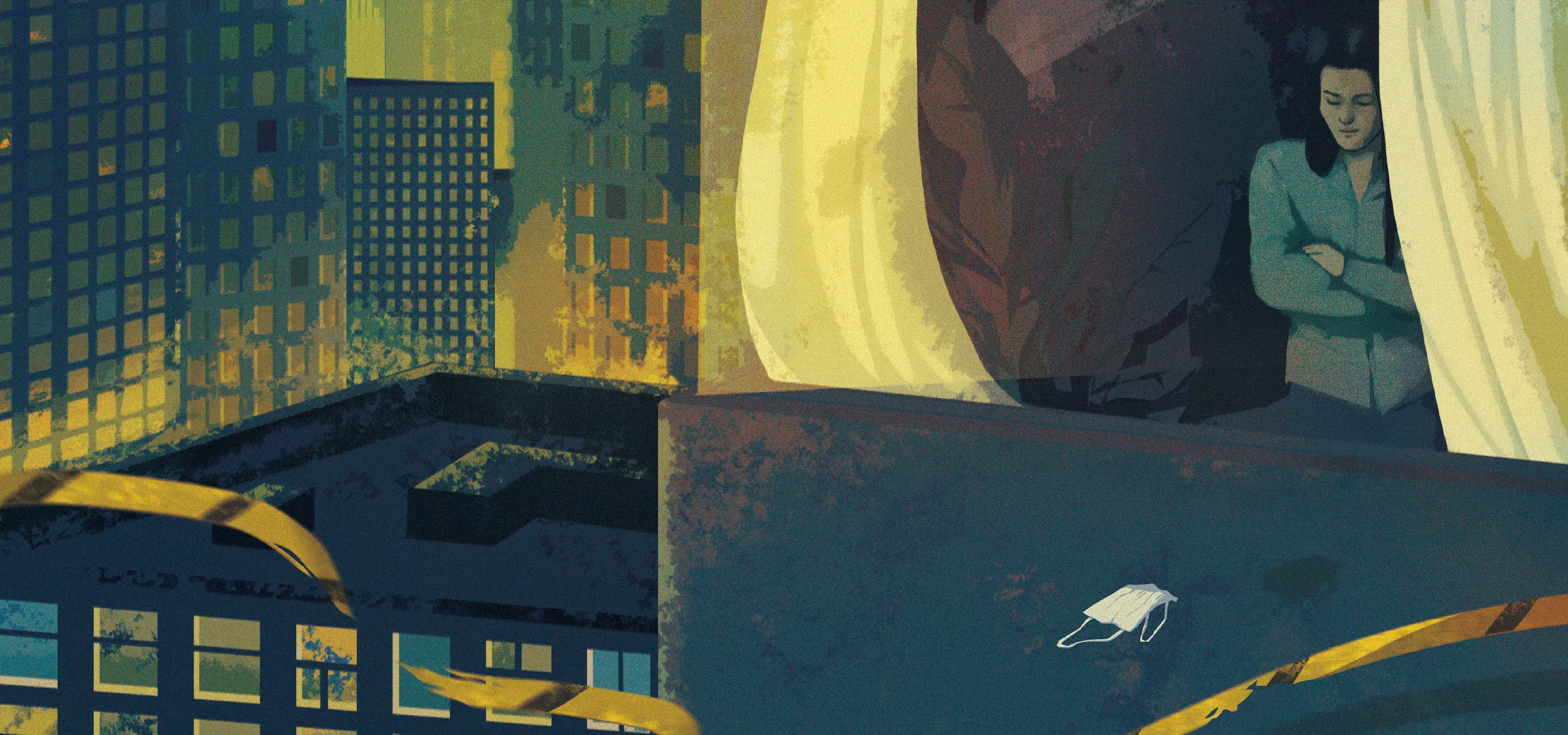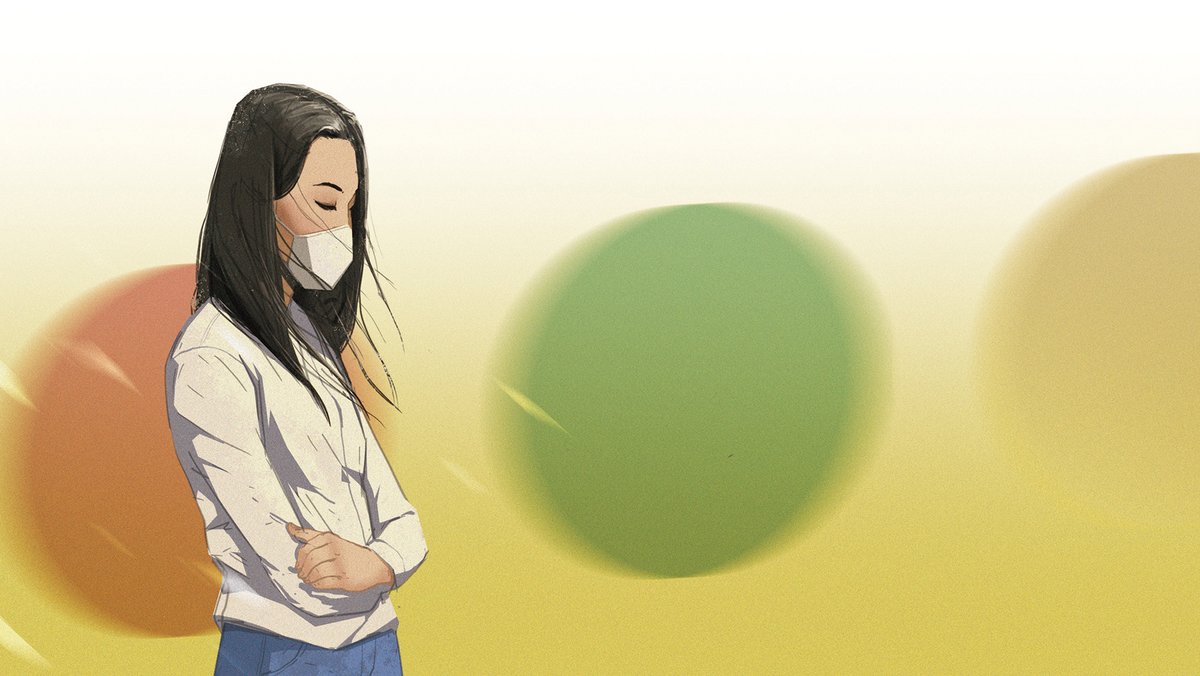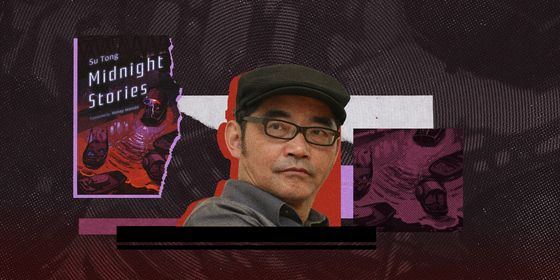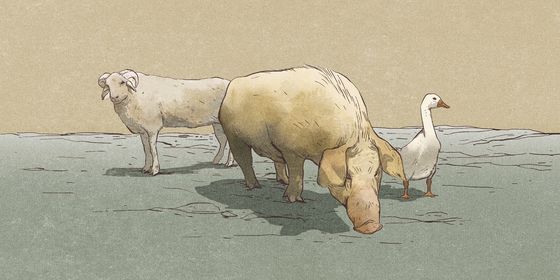Author Han Jinliang’s contribution to the growing body of Chinese Covid literature on pandemic restrictions and collective loss
Mingming saw an incoming call from her mother while she was standing in front of the entrance to a clothing store. The shop was closed. She picked up the call without speaking.
The mannequin in the window was wearing clothes from last season and had a sheet of A4 paper pasted to its bare legs bearing a message in Chinese: “ENTIRE STORE 70% OFF.” The interior of the store was lit and there was another sheet of paper attached to the door, which bore the QR code of the state health check program and a handwritten note, advising, “Occupancy limited to five people at a time. Please maintain social distancing.” But there was nobody inside. Even the manager seemed to have disappeared.
Mingming’s mother was telling her about her grandma’s funeral. There were so many things to do. She didn’t mention the deceased herself. Just the year before, Mingming had bought a pair of UGG boots from this store and mailed them to her grandma. They arrived a few days after her birthday banquet. They were brownish-red suede, lined with fleece, and somehow loose and snug at the same time. “These boots could stand up to some use,” her grandma had said. “I wonder how they made them. They feel soft, but they’ve got some strength to them.” She stuck her hands into them and held them up like she was going to wear them that way.
“That stuff’s all made in China,” Mingming’s aunt’s husband said. “Not worth much. We don’t lack for anything these days, and we’ve got central heating. You won’t need to wear those.”
Mingming’s grandma seemed not to have heard. She asked Mingming when she was coming home. She wanted to know if the store would go out of business. She asked how bad the pandemic was outside of China. She began to cry then, as if she had realized that she was powerless to help her granddaughter and blamed herself for being one of the many that had encouraged her granddaughter to blunder into calamity. Mingming did her best to comfort her grandma through the video screen. She told her grandma that she would make a bet with her about how long the boots would last.
“I bet they last you three years,” Mingming said.
“I’m not going jogging in them,” her grandmother laughed. “I bet they last me ten years, at least.” A year later, her grandma was dead, and the boots were still brand new. “Since nobody wants them, I might as well take them,” her aunt’s husband had said.
Her aunt’s husband had handled the funeral arrangements. His goal was to—as her mother put it—“make sure the family’s dignity was preserved.” Mingming’s father shouted in the background: “He might have preserved it, but he didn’t impress anyone. There was one bottle of baijiu and one bottle of red wine for each table. If you wanted to drink more, you were out of luck.” When Mingming called her mother, her father always demanded her to be put on speakerphone. He never came close to the phone but chose to howl across the distance. He was like the people on the internet that choose to post their insults under a sock puppet account.
The complaints always ended with a cough, a snort, and the forceful expectoration of a loogie. Mingming could picture what came next: her father pinching one nostril after the other shut to blast his nasal cavity clear of snot, as if he could expel the target of his rage. She pictured her father as some swamp-dwelling beast that expressed aggression through its mucus. She hung up before he could complete his ritual.
Mingming’s travel agency was in the same mall as the clothing store. It was near the center, but it had a corner space, with one side facing the escalator and the other side facing the bathrooms, so there was plenty of foot traffic. That was why Feng Zhaoting pushed her to take the space. During those two months they were open, a number of customers had come in because they were waiting for someone to use the washroom. They would come in, start looking at the promotional posters and end up signing up for a package tour. Whenever this happened, Feng Zhaoting would pace around in front of her. His face did not betray any emotion but the muscles in his back twitched spasmodically as if he was about to sprout wings and flap away.
At the time, he wasn’t getting any business himself and he still hadn’t gotten his driver’s license. He wouldn’t achieve much success for a while. But Mingming did her best to take him along with her. He had a few things going for him: He kept his nails clean and trimmed, the lenses of his glasses were always free of fingerprints, there was no dandruff on his collar, his mouth didn’t smell like her father’s mouth, his clothes didn’t smell like her father’s clothes, and even when he acted a bit smug, like after the walk-ins signed up for a tour, it was kind of endearing.
She unlocked the door. Inside the office, there was a faint smell of dust. The dish on the counter still had a few chocolates in it, probably expired or close to it. As she walked across the floor, she heard it creak under her feet. When there were people around, the sound was usually covered up, but it was annoyingly sharp in complete silence.
Mingming sat down and opened the sandwich she had bought at the supermarket. It wasn’t very good, but it was small enough that she was taking her last bite before she realized. Buying necessities was one of the few permissible reasons to go out during the lockdown, so people lingered in the supermarket aisles, inspecting mundane products as if they were pondering a masterwork in a museum. The employees stationed at the door didn’t actually do anything. If you stopped to disinfect your hands or swipe your app, there was no reaction, and charging past them would only inspire a furrowed brow, a shake of the head, or a weak exhortation muffled by a mask. When Mingming first arrived, she told her mother, “Everyone always smiles at each other here.”
“They want you to open your wallet,” her father had grunted. “You international students are nothing but cash cows.”
The neighboring stores opened up one by one. Nobody wanted to wait until nighttime. Each time the lockdown was lifted before, Mingming had rushed through cleaning up the office, getting back in touch with drivers and contacts at scenic spots, updating her price lists, printing new posters—and then they got locked down again. Two times, three times, five days, a hundred days, back in to open up shop again, clean everything, take down the old posters, send out a message about a special offer...
The sixth lockdown had lasted more than two months, but it was supposed to be the last one. Before opening the travel agency, Feng Zhaoting had told her to consider the future, and what it would be like rushing another brigade of tourists to the same old place. There would be tough days, and there probably wouldn’t be much money in it, either. So, he asked, what is going to get you through it?
“You’re not just putting all your eggs in one basket,” he said, “but you’re borrowing eggs from other people to stick in somebody else’s basket. You’re in charge of everything. It’s all on you yet nothing is on you.”
Mingming understood what he was driving at, but she went ahead and put all her money into the travel agency. It had gone okay. She would have done even better if the international tourists hadn’t disappeared, followed by a shutdown of travel within the state and the city. She still felt the same way, even after everything she had been through.
The store managers had begun greeting one another. Mingming ate one of the chocolates, dumped the rest in the trash, then left.
She walked to a small square beside the mall. She felt a tap on her right shoulder. When she turned to see who it was, she heard a laugh coming from the other direction. “How’s it going, Little Dragon?” Xiao Meng asked. He never got tired of these little games. Mingming always fell for them. Xiao Meng wasn’t wearing a helmet, and his electric scooter, which he never seemed to part with, didn’t seem to be nearby.
The first time she met him, the handlebars of his bike had been loaded with takeout bags. He was stretching out his hands, half-falling off the scooter, trying to hit the “walk” button at a pedestrian crossing. Mingming reached out and pressed it for him. “Thanks, my Little Dragon!” Xiao Meng called out before screeching off. The next time he saw her, he gave her a pile of bright yellow bags from a takeout delivery app. The overseas Chinese had two main delivery apps to choose from: one, with a blue logo, was called Quick Eats, and the other one—the one Xiao Meng worked for—had a yellow logo and was called Happy Panda. Business was good, she heard, because these two apps used the same color schemes as the two major delivery apps in China. Everyone figured they must be related.
Xiao Meng called her “big sis” sometimes, and sometimes “Little Dragon.” He ripped through the few orders he took, making use of his collection of shortcuts, then sat in the square playing with his phone. When he wasn’t playing games, he liked producing content for a short video platform. Mingming always wondered why he called her Little Dragon. Eventually, he told her: the first time they had met, she was wearing a hoodie that had two puffy balls at the end of its strings, and it reminded him of Little Dragon Maiden in The Return of the Condor Heroes, who also had two balls on her ribbon. Mingming had never been big on wuxia books and she never ordered takeout, so she figured their connection would end at a nodding acquaintance, but once she found out they were the same age, they talked a few more times, and she found herself seeking him out on his bench under the tree in the square.
Xiao Meng had come over on a work visa. When it was about to expire, he had switched to a student visa. He took a few classes, but he didn’t take it very seriously. As long as he could extend his stay, he was happy. “What are you going to do when you graduate?” Mingming asked him.
“I’m not going to graduate, sis,” he said, as if the question was almost too foolish to deserve an answer. “I’m here to make money.” He pulled down his mask and tipped back his greasy helmet so that he could trigger the facial recognition on his phone. He wanted to show her his videos. His videos had a clear theme. The first one he showed her had him breaking some bread into crumbs and tossing them to some pigeons. “Come and eat,” he said, and the birds swarmed. They were on the table, on the ground, on his shoulders, pecking his hands, randomly expanding and contracting their little meaty bodies.
The videos were all similar. Some received no engagement and others had plenty of likes. Visible in the pigeon videos was a sign that advised it was forbidden to feed them. “It doesn’t matter,” Xiao Meng said. “Nobody cares. If anybody says anything, I just pretend I don’t speak English.”
“Do you make any money from these?” Mingming asked.
“No way,” Xiao Meng said. “I can make way more from one delivery.” He opened the last video. “But look, this got a thousand likes. You don’t fool around with this stuff, so you don’t get it. A thousand likes isn’t easy.”
Mingming couldn’t help but laugh. Liangliang did the same thing to her—bragged about all sorts of things and then added, “But you wouldn’t get it.” They always came back to show her more, though. Liangliang was her younger brother. The pregnancy hadn’t been planned. When her mother was pregnant, she thought she was going to have another girl, so the entire family told her to get an abortion. They told her it wasn’t worth paying the fine for a daughter. If the family planning officials made trouble, it could affect the whole family. Mingming’s parents went back and forth on the decision for a while, but they eventually chose to have the baby. It turned out to be a boy.
“Just goes to show,” her father said, “that the darkest clouds have a silver lining. You know the story of the guy that dropped his ax in the river? A goddess reaches in and shows him a gold ax and a silver ax and asks which is his. He grits his teeth and tells her neither is his, that his was made of iron. In the end she gives him both the gold ax and the silver ax in addition to the iron ax as a reward for being honest. What does that mean? It means good people get rewarded. But it also means that you get rewarded for sticking to your guns.” When she heard that, a cloud of formerly chaotic thoughts finally took shape in her head: If her brother was the reward, then she was the iron ax.
“Are you taking a break?” Mingming asked Xiao Meng. They had walked over to a tree but neither had sat down.
“I got hurt,” Xiao Meng said. “Have a look.” He reached down and rolled up one of his pant legs to reveal a ragged purplish-red wound patched up with a few bandages. He had run into a border collie while cutting through the park. Thanks to his quick reflexes, both he and the dog had gotten away with minimal injuries, but Xiao Meng had gotten fired. He found another job a few miles out of town, working at an orchard.
“Couldn’t you work for the other delivery company?” Mingming asked. “Take off the yellow jacket and put on the blue. Should be fine, right?”
“I can’t go work for the competition,” Xiao Meng said. “That was the rule. Not to mention, I was screwing with them the whole time. If I went over there begging for a job, I’d never live it down.” He handed her a stack of restaurant coupons. “I want you to have these.”
“Is this place any good?” Mingming asked, studying one of them.
Xiao Meng smiled. “They don’t use the right kind of spices,” he said, “but it’s good enough. You should visit my hometown sometime. I’ll take you to eat the real thing. There’s not much that my promises are good for, but I can guarantee it’ll knock your socks off.”
“Make sure you stay safe out on the farm,” Mingming said. “You saw that news story a little while ago, right?” She was surprised by her own reluctance to part with her friend.
“I saw it,” Xiao Meng said. “I’m a big boy. I’m not afraid of anything. Anyways, I’m just as safe there as anywhere. You heard what happened up our way, right? The police got on some drug dealers. Husband and wife. Both teachers. The cops busted in and found a bunch of money and guns. They needed them, since if somebody broke in, they couldn’t call the cops. That’s how they caught them: a guy was trying to rob their place and got so scared he went to the cops himself.”
Mingming laughed. Xiao Meng handed her the bag of bread he had been holding. When she looked closer, she saw it was the toasted ends of a loaf of bread, ripped off the loaf. “If you see that fat one around here tomorrow—he’s got a purple neck and he’s always clucking—make sure he gets fed. That’s my lucky pigeon. He’s not around today. I better get going, sis. I’ll see you around.”
The light through the tree cast bars of sunlight on the pavement. A few pigeons moved through the sunlight. The leaves on the branches above her shook gently. The pigeons moved just as slowly. Without his eye-catching yellow jacket, Xiao Meng quickly blended into the crowd. Mingming suddenly remembered that she wanted to buy a hobby knife to open a parcel with. She headed for the supermarket. A parcel that used to take a month now took three months to arrive. And it had already been sitting at her place unopened for another two weeks.
Everyone in the supermarket seemed to be in a cheerful mood. The frenzy for shopping had to start from zero. Mrs. Yao was in the next aisle over, telling someone about getting the vaccine. Mingming had heard the story before. Mrs. Yao and her husband had been trapped here by the pandemic while visiting her son and his wife, who had just had a child. She was stuck living with her son’s in-laws.
At first, both sets of parents had been in a hurry to leave, but then they had entered a competition to see which could outlast the other. They each wanted to prove their superior devotion to the young couple. A few months later, her son rented a place for her and her husband, and his in-laws stayed at their apartment looking after the grandchild. The two sets of grandparents were finally separated.
Due to “five-kilometer” rule on traveling from one’s home for essentials during the lockdown, Mrs. Yao would go a few weeks without seeing the kid, but she had mostly given up on returning to China. She loved singing nursery rhymes from her hometown for the kid. Though he wasn’t a quick learner when it came to everything else, he caught on quickly to her quirky tunes. What pushed her to move out, however, was that the child was eventually poisoned against her by his other grandmother. Mrs. Yao was vanquished.
Mrs. Yao lived across from the elevator on Mingming’s floor. Mingming’s place was at the far end of the hall. The hallway was fairly long and the soundproofing was good, so it was quiet. Mrs. Yao couldn’t speak English but she somehow had more intel than anyone else. Mingming would often find herself stopped on her way out of the building by Mrs. Yao’s firm, warm grasp. Most of the Chinese people in their building spoke Cantonese and they formed their own circle, so Mrs. Yao seized on any opportunity to find another Mandarin speaker.
That day, when Mingming had been suffering from a bad reaction to the vaccine, she had prepared for the worst by sending her bank account information and password to her mother on WeChat. She had a sudden thought: If they really do take me out of here on a gurney, at least Mrs. Yao will be able to relate the story of my pathetic existence as a piece of gossip. She would definitely make it more colorful than it actually was.
Hearing the familiar voice in the supermarket, Mingming was careful to avoid Mrs. Yao on her way to pick up the knife. She chose the cheapest one on the shelf.
The wind picked up and it seemed to gust even harder as she went between the buildings. Early spring temperatures did not feel much warmer than the winter, but the sunshine was back. Unlike the previous few months, it was still bright until six or seven in the evening. With the wind blowing around her, Mingming paused and squinted. She could make out Feng Zhaoting.
He was the same as ever. Even when he had no business to attend to, he never allowed himself to take a break. He was dressed immaculately. His posture was excellent. He held himself perfectly straight, but his right arm was wrapped around a girl whose oversized jacket flapped in the wind like a flag. The girl released herself from his grip and came toward Mingming, heading for the milk tea shop down the street behind her. Beneath her dark brows, the girl’s eyelashes twitched like a fan. Her shiny eye makeup flashed like gleaming flames each time she blinked her eyes. Since she has to cover up most of her face with a mask, Mingming thought, she must put all her effort into brightening up what’s left.
Feng Zhaoting pulled down his mask, took a drag off his vape, and trotted over to Mingming. “Give me a break?” he said.
Mingming tilted her head and looked at him. He pulled his mask back up. A fine white vapor leaked out of the edges. “I sent you some WeChat messages. Did you block me?”
Mingming stared at the red crossing light. “Is there something you need to tell me?” she asked.
“I just wanted to tell you,” Feng Zhaoting said, “there are relief subsidies available right now.”
“I got them,” Mingming said.
“Fine. Unblock me. You don’t have to show me anything you don’t want to. I can help you out with advertising. Being sensitive isn’t a good trait for someone who wants to run a business.”
The green light flicked on. Even though she knew it would look like she was running away, she dashed across the street. She could imagine the bitter look on Feng Zhaoting’s face. He couldn’t help but notice the plastic bag with its ripped up slices of bread.
The lobby of the building smelled of disinfectant and air freshener. Mingming’s eyes felt hot. She got in the elevator but didn’t press the button. It took her down to the underground garage. She pulled her mask down and took two deep breaths. She went to get her car. It had been a long time since she had driven it. The cars in the garage were kept on a mechanical lift, so every time her car was taken out, there was a horrific battle. The metal of the lift shifted and rose, and her white Camry emerged from the darkness. It was an event that deserved a thundering soundtrack, a smoke machine, and a blast of confetti.
When Mingming bought the car, somebody else had already owned it for seven years. It had been in her possession for seven more years. The first time Feng Zhaoting had sat in it, he asked her, “I thought you were a germaphobe. How could you buy a secondhand car? Aren’t you worried about what the last owner did in here? Trade it in for something nice.” He hadn’t been in Australia for long. He was sitting on the passenger side but thought he was in the driver’s seat.
Later, she and Feng Zhaoting moved in together. They rented an apartment in an area where most people went to bed at nine o’clock. The old car took them to the beach and to the forest, to see open-air film screenings, sunrises, and meteor showers. The car carried them to Costco every two weeks. You could buy just a couple of things and fill the trunk: a pack of toilet paper with forty-eight rolls in it, a three-and-a-half-liter jug of milk, a box of twenty-four croissants, a bag of chips the size of a pillow, a canister of snacks the size of a paint bucket, inexhaustible stores of cling film and tinfoil…Mingming had planned to learn to drive in the old car, then trade it in for something new. But then she wavered.
We were brave, Mingming thought to herself. The romance started to fade at precisely the moment they started buying furniture for the place. They were suddenly using the same scent of shampoo. There was no longer any difference between them. The mystery was gone. The attraction was gone. That bottle never seemed to reach its end. The expiry date was two years away. As long as it was around, they would stay together. They were bound together by a good deal on bath products.
“We’re all just trying to get through life,” Feng Zhaoting said one day as he made braised pork belly. He liked putting together an extravagant meal. Only the tired, old hood vent and the far-too-sensitive smoke detector ever complained. The first time the two of them had heard the piercing bleat of the smoke alarm, they had raced to switch off the heat and fan the place out. The thought of having to pay a fine for setting off the alarm heightened the urgency.
Later, they figured out a process: One person would open a window, and the other would get the flash frying done as quickly as possible. If the alarm went off, the person at the stove would carry the pot to the window and the other would climb on a chair and cover the smoke detector with a bowl. They started calling it the caramelization detector since it would always go off when they were frying rock sugar for braising pork.
Feng Zhaoting was doing his best to get through life, but it had nothing to do with the kind of life she wanted to live. He got into the swing of things quickly. He became a local. He knew how to enjoy himself. The people she introduced him to became his friends. The places she brought him to became his usual haunts. She was just getting started in business, but he was already joining local chambers of commerce.
They moved into a Chinese neighborhood, so it would be easier to make connections. Their home became a place to socialize in. Mingming was often entertaining people whose names she couldn’t remember. In the end, Feng Zhaoting started doing his socializing in other places: on the soccer pitch, out on a fishing boat, in a winery...He rarely brought people to the house. Mingming wasn’t ungrateful. She realized that there was more going on below the surface, that these people had been a sort of buffer.
Feng Zhaoting comforted her. He told her to adapt. “Back in China,” he told her, “these sorts of people wouldn’t come knocking at our door. But here, I’m still in the accumulation phase. Quantitative change produces qualitative change. We need to rely on people to build ourselves up and get to the point where we don’t need to rely on them anymore. But if you can’t handle it, I don’t want you to worry. As long as I’m on my way up, you’re on the way up. The things you’re fretting about for a month, there are people out there who could get them done with a word.”
Mingming turned back to her computer screen. She kept researching routes, software, and accommodation. She wrote up content for her social media. She couldn’t decide if she resisted his speechifying out of principle or an aesthetic judgment.
He stood behind her and rubbed her shoulders. “Forget about it,” he said. “We’ll get through it together. You’ll be in charge of the struggle and I’ll be in charge of calling the shots.” He seemed to have forgotten how pained and helpless he had felt when they were dodging calls from creditors. The man that used to hand the phone to Mingming whenever he saw a long-distance call from China had already stepped out of the shadows. They had the divine protection granted by a relationship where neither partner can imagine life without the other. That’s what spelled their end.
Mingming warmed up the car, switched the engine off, and left. The door to the garage had a sign on it in English and someone had pasted a crude machine-translated Chinese message below: “Please suppress green fastener at the least two seconds, red fastener suppression possibly causes serious results.” Back on her floor, Mingming saw someone step out of the other elevator ahead of her. He was heading for the apartment on the corner.
She knew that a woman lived there—maybe not the same one as before, but similar: Asian, thin, quiet. She didn’t know where the woman was from, but she had visitors from all over. Some of them went straight for her door. Some of them got lost in the hallway. Mingming had run into them before. When the men saw her, they were curious. Their expressions betrayed lust and expectation, as if they knew her or were about to know her. When she thought back, Mingming suddenly realized that they had taken her for a prostitute—one that they had not yet had the pleasure of meeting.
A feeling of disgust rose and then dissipated, replaced with an indescribable joy, as if she had been affirmed in some alternate dimension. Mingming lingered in the hall, trying to catch sight of the woman. The person behind the door was cautious, only opening the door by a crack when the man arrived in front of it. It was dark inside. The crack in the door only allowed a complex, warm fragrance to drift out. It lingered in the hallway like a string of chimes.
When Mingming got home, the massive parcel was laid out across the living room floor. She had gotten used to walking around it. She sliced it open and took out the padding layer by layer. She remembered when she was a kid at her grandma’s house, kneeling in front of a parcel sent from Taiwan by her great-uncle on her mother’s side. The adults took out each item in turn and identified it. She could not really remember what these items were. All she remembered was her aunt’s husband complaining. “He’s been here before,” he said, “and he’s seen how well we’re living. What do we need this stuff for? What’s the point in sending it?”
Mingming, her little brother, and her cousin were impressed. They sniffed around until someone tossed them each a bag of snacks. Her bag had a picture of a girl with big eyes on it. She copied it so many times that even many years later, whenever she was buying a pen and wanted to test if it had ink in it, she found herself drawing the girl from the snack package.
The parcel was full of smaller parcels packaged up together by the shipping company. She tried to think back as to what each one contained. The small one very likely contained her and Feng Zhaoting’s screen covers. The soft one was probably Feng Zhaoting’s socks. His weight tended to fall on his instep when he walked, so he went through socks fast. She tossed the still open scissors on the floor. She didn’t want to rip open any of the packages.
Outside the window, she heard a rising cheer. It was already dark. She heard doors opening and closing in the hallway. Except for fire alarms, it was rarely so busy in the building. They lived on the thirtieth floor. When the fire alarm went off, the fire truck was already usually pulling up by the time they got downstairs. When they got the order that it was okay to go back inside, the neighbors would be grumbling. Mingming and Feng Zhaoting laughed behind the backs of the foolish people that had not yet mastered how to defeat the caramelization detector.
After a while Feng Zhaoting came to the conclusion that it was all for nothing. Someone smoking a cigarette could set off the alarm. It was better to just live with it. There was no reason to go all the way downstairs every time it went off. Many people that live in high-rises start to feel the same way. But Mingming could never accept that idea. Whenever the alarm sounded, she would grab her keys, her phone, and her purse, and force Feng Zhaoting to put down his work and follow her down the endless flights of stairs to the ground level.
There was one time that he refused: Instead of going down, he took her up to the top floor and had her watch the fire trucks come up the road. He told her that even if there was a fire, she didn’t need to worry. “It’s fate,” he said, then wrapped his arms around Mingming and kissed her. There were a few excited dog barks from the stairwell, competing with the voice over the PA commanding them, “Evacuate now.” Her heart almost leaped into her throat and into Feng Zhaoting’s mouth. After a while, it grew silent. The sound-activated lights switched themselves off. The only illumination was the tiny green man on the exit sign. He was the only person left that cared about running.
A light came on in her peripheral vision and Mingming turned to look. Her phone screen informed her: “Dear Mingming, your Costco membership has been automatically renewed. Effective from...” She unlocked her phone and scanned the message until she came to the end: “Zhaoting’s family membership will be effective for the same period.” With perfect timing, the doorbell rang. Feng Zhaoting’s face appeared on the intercom screen. Mingming popped up from the floor as if summoned by something. Her shoulder ached, but she raised her hand and moved it inch by inch toward the screen.
He told her that he had come to deliver pepper spray. “Once they lift the lockdown,” he told her, “it’s going to get chaotic. Everyone’s been holding back. You need to look after yourself.” Mingming was skeptical. She watched him go over to the refrigerator, and open it, ready to help himself. He sighed and shut it again. “I knew this is how you were going to end up,” Feng Zhaoting said. “You’ve got the curtains wide open, stuff all over the floor...” With the curtains open, the lights from the building opposite shone into the room.
“How long has it been since you’ve talked to any of your friends?” Feng Zhaoting asked.
“You mean your friends?” Mingming asked. She wanted to smirk but felt like it was too clear of a provocation. She managed to catch herself, but the stifled smile might have been even more mocking.
Feng Zhaoting leaned on one of the barstools that they had bought together. He acted as if he was struggling with what he was about to say. “Mingming,” he said, “you’re not stupid. If there’s a shortcut, why not take it?”
Mingming walked to the window. The building across the way was a twin of her own. They both had the same layout, with apartments over shops. People called them the Silver Building and the Gold Building because of the color of each roof. Nobody shut their curtains. When night came, each window became a screen. The parties were already beginning. The windows that were dark probably meant that people were celebrating somewhere else. Screw social distancing. Once the music was blasting and bottles were popping, it was easy to believe that the good times were back.
She heard Feng Zhaoting coming toward her, tripping over the box, and steadying himself. “Just say the word,” he said, standing behind her, “and I’ll move back in.” He paused for a moment and said, “We don’t have to talk about whatever happened.”
Mingming recalled the girl with the flaming eyes. Was she at a party already or was she waiting for Feng Zhaoting to come back? Now that the mask mandate was over, she could show everyone what she did to the rest of her pretty face. Mingming suddenly regretted her unflattering speculations about her.
Feng Zhaoting put his hands on Mingming’s shoulders and started to turn her toward him. He mistook her silence for contemplation of his offer. He smiled encouragingly. “Desperate times called for desperate measures,” he said. “What do you think?”
“You’re not stupid, either,” Mingming said. “Why don’t you get it yet? We didn’t break up because of the lockdown. It wasn’t because we couldn’t go anywhere. It’s because I don’t want to make things right with you. I definitely don’t want you telling me what ‘right’ is.”
“I’m trying to help you, not hurt you.”
“Do I look like someone that can’t figure things out by themselves?” Mingming said. It felt like she had been transported to the day before they broke up, trying to figure out why they had the same fight over and over again.
Feng Zhaoting squeezed her shoulders a bit harder. “You think you’re so wonderful,” he said. “You think you’re the only one with self-respect? Just tell me what you want. You’re the one that wanted to break up. I’m trying to make it work. You want me to beg you?” He turned away from her and kicked at one of the packages that seemed to cover the entire floor of the apartment.
“What kind of person can turn ‘self-respect’ into an attack on someone?” Mingming said. “You love telling me how to live my life, so let me try doing the same for you. Go find a woman that doesn’t know anything about your past. Find a woman that hasn’t heard all of your little stories. It’s best if her memory’s not too good, so she can forget that you change the details a little every time, and doesn’t notice how many times you’ve told the same story. You should find a woman that has never seen you sobbing because you got your qualifications stripped for trying to bribe the examiner. You like coaching fresh meat, so go find someone that believes you’ve always been so goddamn amazing. And make sure she’s nothing like me now, who can’t hide the fact that I know every single thing about you—”
Feng Zhaoting rushed toward her. Mingming thought he was going to hug her. Before she could finish speaking, her words had become a howl of pain. She knew with absolute clarity that the knife she had just bought at the supermarket had been jammed into her chest.
Mingming lay down in the same spot where she’d lain before. The floor was so cold. Feng Zhaoting knelt beside her, holding his trembling hand over her chest. He moved his hand away but then put it back. He considered pulling out the knife and then did not. Mingming struggled to look up. Snot and tears ran down Feng Zhaoting’s face above hers. He lifted his hand and saw that it was covered in blood. He whimpered. Mingming thought about her grandma and the boots on her hands. She wanted to scold her: “You wear them on your feet! What good will it do to wear them on your hands?” Feng Zhaoting’s phone vibrated. It seemed to wake him up.
“Think about what you’re going to say,” he said. “I’m calling an ambulance.” He paused. “Okay?”
“The...glorious...relaunch...” Mingming mumbled.
“What are you saying?” Feng Zhaoting asked, staring in blank shock.
The lenses of Feng Zhaoting’s glasses reflected the Chinese advertising slogans running across an animated billboard on the Gold Building. Each character glittered across the glass in reverse. She identified them one by one: “Preparing...grand...reunion.” They began to change colors. She thought to herself: It really is better to leave the curtains open. Feng Zhaoting’s mouth gaped. It was impossible to know whether he was crying out or laughing. His teeth were lit blue by the billboard.
In a few minutes, the countdown would begin, just as they had all agreed. There would be cheers and shouts of joy. It would be like Christmas. It would be like New Year’s Eve. Mingming saw the bag of toast. She noticed the smiling face printed on the bag, and beside it, a slogan: “You’re the best thing since sliced bread.” She tried to remember what color Xiao Meng’s lucky pigeon was. She shut her eyes. She fell into memory.
Author’s Note: I used to think the world was growing into a whole, but since the outbreak of the Covid pandemic, it has been torn apart both actively and passively. The spirit of many people unmistakably withered. Looking back to three years ago, I can’t help but feel a sense of loss: Those who we want to embrace remain out of reach, things we cherish have blown away in the wind, and we don’t know when things will return to normal. I’m afraid that before healing takes place, we will never know what we have collectively lost. The only thing I can do is to record.
Liberation Day | Short Story is a story from our issue, “Promised Land.” To read the entire issue, become a subscriber and receive the full magazine.














